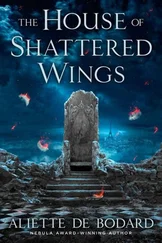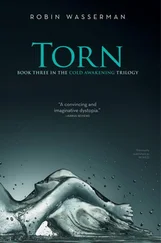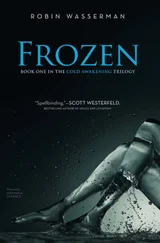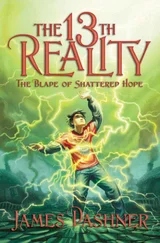Not that it would have mattered, once she got sick. I even looked up the disease, some kind of bizarre immune-system disorder that couldn’t be screened out and couldn’t be treated. None of the zones had any pics of that. But I knew it would have made her sick and fragile and, even without the weekly lipos, skinny. Without the download, it would have made her dead.
None of it told me anything, except that this girl wasn’t me.
But maybe that was the one thing I needed to know.
There was no chance that BioMax had illegally downloaded a copy of my brain into another body, that the second, secret Lia Kahn had gone insane, taken on a new name, a new persona, and decided to kill a bunch of people she’d never met before. No chance whatsoever.
But it didn’t hurt to confirm that Ariana Croft was a real person. A damaged whackjob, maybe, but not me. Even if she looked like me.
Our bodies were just things, right? My body was one thing. Her body, despite the choppy haircut and bad dye job (violet with green streaks), was another. Sometimes I ripped my eyes from the vids and stared down at myself, feeling as disconnected as I had those first few days after the download, untethered from legs, arms, skin, fingers, all of it seeming to belong to someone else. Sometimes I reminded myself that even if there had been no Ariana Croft (which there was), if someone at BioMax had figured out a way around all the safeguards (which they couldn’t), and for some nefarious purpose had created another Lia Kahn in body and mind, it still wouldn’t be me. It would have just been a copy, and by definition, a copy wasn’t the same as the original.
Except that I wasn’t the original either.
Except that if my brain and body were destroyed, my backed-up memories would be downloaded into a new brain. Another copy. And it would feel like me. It would be me. That was the whole secret to mech immortality, right? When is a copy not a copy? Not much of a riddle, because the answer is obvious: when it’s identical to the original.
Maybe. But I didn’t trust the logic enough to test it. I could ditch this body for a new one with a new face. This me could die, and an identical copy would live. Same difference, right? Except I was afraid it wasn’t.
I was afraid.
These were the kinds of things I tried not to think about when I wasn’t busy trying not to think about dead people. Or trying not to think about my father. Or call-me-Ben’s daily, and increasingly threatening, reminders of our “deal,” which for all I knew was moot now that I was no longer under suspicion—but to believe that would have meant ignoring the fact that there were more shadowy, faceless mechs in that vid, attackers still to be caught. Thanks to the corp-town attack, we were all under suspicion, every mech. All of us with no fingerprints and no biostats—and according to Rai Savona and his little puppet Auden, no souls, which meant no moral compass or internal censor and thus nothing to stop us from wreaking havoc, sowing chaos by some kind of infernally programmed design, or just destroying everything around us by virtue of our very nature. I tried not to think about Auden too, telling myself that it could have been worse, whatever he’d turned into—whatever bitter, twisted dupe I’d turned him into—at least he’d lived. But that thought brought me right back to dead people and sent me straight back to the vids, and the whole thing started all over again.
It was like a cut on my lip that I couldn’t help worrying with my tongue. Knowing that I should let it alone, knowing better, but so hyperaware of it every time I spoke, every time I moistened my lips, every time I was sitting around and my mind wandered, just for a moment, away from the constant litany of Don’t do that , and without intent or even awareness, my tongue slipped back into place, exploring the crevices of the wound until the pain woke me up.
I could have stopped myself. Every morning and every night I looked at the small pile of dreamers I’d hoarded, sitting just beside my bed. I’d gotten them from Sloane, and I knew she could be trusted to keep her mouth shut. I’d met Sloane before either of us came to live at Jude’s estate—in fact, I was the one who’d brought her here, who’d convinced her that this, not another boyfriend, not another pointless suicide attempt, was the answer she’d been seeking. She’d spent the last several years, before and after her download, researching methods of escape.
Thanks to Jude—which meant thanks to me—she’d discovered a new one.
These weren’t the puny hour-long dreamers that barely topped the buzz of an intense b-mod. These were industrial-strength dreamers, good for days, even weeks, of blissful mental absence. A nice long vacation from everything.
I kept them by my bed as a test. Every time I passed them by I knew I was stronger than that. I wasn’t that kind of mech. They sat there for days, one week, two, and I kept passing the test, passing them by.
Until one day, I didn’t.
I wasn’t prepared.
Heavy dreamers weren’t anything like the lightweight version I’d sampled.
They dragged you down.
Deeper than I’d ever been.
Trapped in a dream inside a dream.
Blind in a white fog.
Existence and nonexistence in one.
Being and non. Here and not. Pleasure and pain.
That was all there was. All I was.
And I was nothing.
Waking up was like breaking through the surface of a deep, black pool of water, emerging from silent depths into the too-bright, too-noisy open air. Everything was sharp edges; everything was off-key. I just wanted to slip back under.
“I thought you hated these things,” Ani said, standing over me.
“How’d you get in here?” I mumbled. It felt like the dreamer had blown my body into a million pieces, drifting on the wind, hidden in the crevices of the walls and floorboards, dissipated. I was everywhere and nowhere at once. “I locked the door.”
“Quinn had the house open it for me.”
Right. Artificially intelligent locks could be fooled. That was the beauty of dumb, mute technology: You couldn’t reprogram steel.
I reached for the next dreamer. It was set to last a week. “Have her lock it again when you go.”
Ani glanced at the dreamer in my hand. “Or I could stay. We could talk.”
I shrugged. The world was getting too sharp, the fog fading away. The longer I was awake, the easier it became to think. And I wasn’t in the mood to think.
“I’m just worried,” Ani said. “After what happened—”
“Get out.” I didn’t want to remember what happened. That was the whole point.
She flinched.
“Please,” I added. But I didn’t say it nicely.
“If you stay under too long…”
“I’ll be fine,” I said. “The dreamers are safe.”
“Right. Tell that to the empties.”
It was what we called the mechs who dreamed away their lives, twitching and shuddering for weeks on end. Empties because they were nothing without the dreamers; because they were hollow. Bodies whose minds were on permanent vacation.
These days, I only felt empty when I was awake.
I was the center of a storm.
Light swirled around me. Through me. Wind blew in waves of red and purple and black. Color had sound and sound had color. There was no body, but there was pain.
And noise, like metal on metal, like a scream.
And need, and memory, and flesh on flesh, and lips, and the weight of a body on my body.
And weightlessness. And nothingness.
The storm raged, but I was its center, and I was still.
Quiet.
It was getting harder to come back.
When the dreamer died, there was a moment in between. Like the dazed limbo between org sleep and waking when the dream dies away and reality strays just out of reach. It was like falling—but falling so far and so fast, through a darkness without a bottom, that it felt like flying.
Читать дальше












